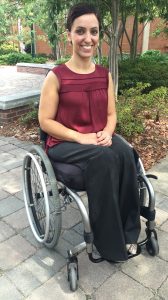
Serinagaoglu is working to connect with students as she works on a master’s degree at Ole Miss. Photo by Jeremy Scruggs
University of Mississippi graduate student Yelda Serinagaoglu grew up in Ankara, Turkey, with a deep love for science. She was an active student when her life suddenly and completely changed.
When Serinagaoglu was 15 years old, she was in a car accident that broke her back, leaving her paralyzed from the waist down. Her major injuries caused her to take a year off from school, postponing her education.
“I had to learn everything all over again and when you’re out of high school for a year, everything is a little foggy,” she said.
But there still was no question that she would attend college. In 2001, she earned a bachelor’s degree in molecular biology and genetics from Middle East Technical University in Ankara.
“I loved science and I’m inquisitive by nature,” she said. “I want to answer questions and dig deep into things. Genetics was always one of my favorite subjects.”
So naturally, her curiosity motivated her to pursue further education. After completing her bachelor’s work in Turkey, Serinagaoglu moved to the United States to earn her doctorate from Ohio State University in 2007.
She then relocated to Memphis to work as a post-doctoral research scientist at St. Jude Children’s Research Hospital.
Although she loved her work as a scientist, she also loved interacting with people.
“I realized one of the best experiences I had was interacting with graduate students,” she said. “I just wanted to be in a university environment.”
This led her to Ole Miss to pursue a master’s degree in higher education and student personnel.
“I drove to the Ole Miss campus one day and fell in love,” she said. “I didn’t even apply anywhere else.”
“She has already made an impact on our campus and in students’ lives,” said Robin Yekatis, a UM disability specialist. “Her desire to connect with people is what makes her perfectly suited to be a change agent and influence positive growth and understanding on our campus.”
Through her entire educational experience, accessibility hasn’t been much of an issue. Although rules weren’t previously in place in Turkey as they are in the United States, accessibility was created for Serinagaoglu because people genuinely cared for her. Elevators and ramps were constructed in her departments at her university to allow her to easily get around.
At Ohio State, accessibility was very structured with ADA accessible residence halls and shuttles to classes. At Ole Miss, Student Disability Services has made campus completely accessible for her as well.
However, since her accident, she feels some people act differently around her, which why the “Allies for Inclusion: Ability Exhibit” is so important.
“I sometimes get a feeling that people don’t want to make eye contact with me, which I don’t understand,” she said. “There’s no special way to act around me, but I notice it’s awkward for them.”
She said the education provided by the Ability Exhibit will allow the campus community to understand how to become allies for those with disabilities.
“Knowledge is power and when you know about someone, you’re relaxed around them. That’s why we need this type of program – to get people to know each other.”
The exhibit is hosted by Student Disability Services from 10 a.m. to 4 p.m. today through Wednesday (Sept. 19-21) at the Inn at Ole Miss. Workshops will be held daily at 10 a.m. and 2 p.m.
To sign up for a workshop, contact Stacey Reycraft at reycraft@olemiss.edu. For more information about the exhibit, visit http://sds.olemiss.edu/ability-exhibit/.